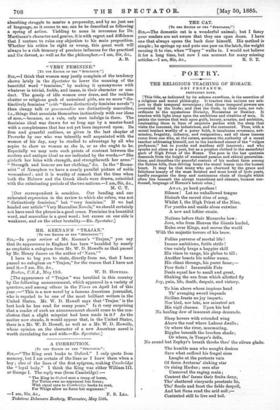" VERY FEMININE."
[TO THE EDITOR OF THE " SPECTATOR."] SLE,—I think that women may justly complain of the tendency shown lately in the Spectator to lower the meaning of the beautiful word "feminine," by making it synonymous with whatever is trivial, feeble, and inane, in their character or conduct. The gossip of idle women over dress, and the reckless chatter or religious gush of untrained girls, are no more "distinctively feminine" (vide" three distinctively feminine novels") than slangy talk or gourmandise are distinctively masculine, i.e., things that associate themselves instinctively with our ideas of men,—because, as a rule, oply men indulge in them. The feminine ideal was drawn for us long ago by a master-hand with a completeness that has not yet been improved upon. Its firm and graceful outlines, as given in the last chapter of Proverbs by one who was tolerably well acquainted with the women of his day, may be studied to advantage by all who aspire to show us woman as she is, or as she ought to be. Especially we may note such points of contrast between the modern and antique ideal as are indicated by the words,—" She girdeth her loins with strength, and strengtheneth her arms." " Strength and honour are her clothing," &c. In the " Economist" of Xenophon we have a nearly parallel picture of noble womanhood ; and it is worthy of remark that the time when both the Hebrew and the Greek ideals were drawn, coincided with the culminating periods of the two nations.—I am,-Sir, &c.,
M. C. T.
[Our correspondent is sensitive. Our heading and our reiterated expression in the review to which she refers, was not " distinctively feminine," but " very feminine." If we had headed our article " Very Masculine Novels," we should certainly not have used the phrase in a good sense. Feminine is a beautiful word, and masculine is a good word ; but excess on one side is weakness, and on the other brutality.—En. Spectator.]














































 Previous page
Previous page